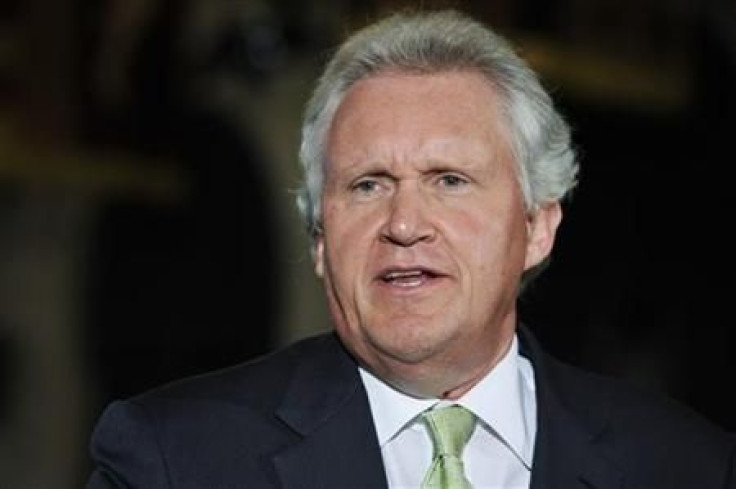Uber May Pick Jeff Immelt As CEO, Investors Like The Idea

Recent reports have claimed former General Electric chairman Jeff Immelt could be Uber’s next CEO, and a new survey finds some investors like the idea.
For the survey, Morning Consult interviewed 500 investors from August 21-22. The investors interviewed had more than $50,000 in the market and a household income of over $75,000. Half of the respondents had investments of more than $250,000.
The firm found 35 percent of investors surveyed believe Immelt should be chosen as the next CEO, while 13 percent say the company should not pick him.
However, many investors are undecided. The survey found 53 percent of investors said they did not know if Immelt be the next CEO.
The number of those who do want to see him in charge of the company increases among investors with $250,000 in market. Among those respondents, 41 percent said Immelt should be the next CEO.
The survey found investors would rather have Immelt lead Uber rather than bring back former CEO Travis Kalanick. One in four respondents said Uber should bring back Kalanick, while one in three said the company should not, and 43 percent said they were undecided.
Meanwhile, one third of respondents said Immelt will do a better than Kalanick as the company’s leader, compared to nine percent who said Kalanick would do better.
Who is Jeff Immelt?
Immelt, who is 61-years-old, worked as chairman of General Electric since September 2001. This year, it was announced he was retiring from the company in August and he wrote a piece about his experience at GE in the Harvard Business Review titled “How I Remade GE.”
“I led a team of 300,000 people for 6,000 days. I led through recessions, bubbles, and geopolitical risk,” he said in the piece. “New competitors emerged, business models changed, and we ushered in an entirely new way to invest. But we didn’t just persevere; we transformed the company. GE is well positioned to win in the future.”
In the lengthy essay, Immelt wrote about duties of CEOs:
“A CEO has different tasks in different cycles. Some CEOs are founders and builders. Others have the luxury of managing momentum through a stable economy or a period when business models aren’t being disrupted. My task was different: remaking a historic and iconic company during an extremely volatile time."
Immelt, who graduated from Dartmouth College and Harvard University, has been named one of the "World's Best CEOs" three times by Barron's. During his time at GE, the conglomerate was named "America's Most Admired Company" by Fortune and one of "The World's Most Respected Companies" in polls by Barron's and the Financial Times.
Most investors have a favorable view of Immelt. The survey found 47 percent of investors have a positive opionion of him, compared to 14 percent who have an unfavorable opinion. More than half of the survey’s respondents said Immelt did an excellent or good job as CEO of GE.
Will Immelt Boost Uber?
If Immelt is to become the next CEO, he will face challenges. One of them might be that he is not a tech CEO like Mark Zuckerberg or Tim Cook. However, Jason Schloetzer, associate professor at Georgetown McDonough School of Business, thinks someone with a “traditional tech experience” isn’t particularly needed to move Uber forwards.
“An executive with meaningful experience in hardware and software development, deployment, and partnership execution might be a better fit than a traditional ‘tech’ executive,” Schloetzer told International Business Times.
Other challenges will include facing Uber’s numerous scandals.
The scandals forced Kalanick to step down from his position at Uber following an internal investigation into the company led by former Attorney General Eric Holder after a former employee wrote about her sexual harassment experience.
Besides sexual harassment, Uber faced backlash over its toxic work culture detailed in a New York Times report, which included drug use, homophobic verbal abuse and harassment. The company was also accused of stealing self-driving technology information from Google’s Waymo unit. Uber ran into trouble with the Department of Justice after the revelation of Uber’s use of its Greyball tool, which collected data to evade authorities and operate its services illegally. The company was also affected by the #deleteUber campaign earlier this year, which took off after President Donald Trump introduced his travel ban.
If Immelt were to become the next CEO, he will have to pick up the pieces and remake Uber too.
“Hiring Immelt would immediately give Uber at least two extremely valuable resources -- legitimacy and time,” said Schloetzer. “His initial decisions would have gravitas and likely be viewed through the lens of ‘this is what the company needs to get better right now.’ In all likelihood, he would be given time to stabilize the more typical operational inner-workings of a large organization. However, these resources can only be effective if the board and investors provide Immelt with the space he needs to work through the company's internal issues.”
© Copyright IBTimes 2024. All rights reserved.











